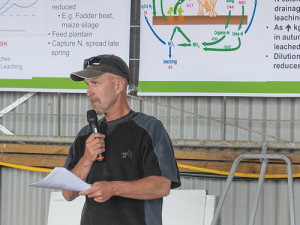Precision N application test costs 'outweigh returns'
Precision application of nitrogen can improve yields, but the costs of testing currently outweigh improved returns, according to new research from Plant and Food Research, MPI and Ravensdown.
 Sharemilker Tony Coltman, the first farmer signed up for Meeting a Sustainable Future project speaks at the programme launch.
Sharemilker Tony Coltman, the first farmer signed up for Meeting a Sustainable Future project speaks at the programme launch.
Farmers will have to look at their fundamental farming systems if they are to meet future nitrogen leaching limits.
Farmers might not have to move completely away from “the philosophies we all grew up with,” says DairyNZ science manager Dave McCall, “but we are going to have to dig deeper than a few small tweaks”.
McCall was speaking at the launch of a new DairyNZ project — Meeting a Sustainable Future — aimed at helping farmers in Canterbury’s Hinds and Selwyn catchments to remain profitable while meeting new nitrogen loss limits under the Canterbury Land and Water Regional Plan (LWRP).
Under the LWRP, Selwyn farmers must reduce N losses by 30% by 2022, and in Hinds by 15% by 2025, 25% by 2030 and 36% by 2035.
The project was launched at a well-attended field day on the Canlac Holdings farm at Dunsandel, in the Selwyn Catchment, run by sharemilker Tony Coltman.
McCall told the gathering he was there to bring confidence that farmers can meet the new limits.
He said the first thing to know is that the more nitrogen that comes onto a farm, the more will be leached out. The question is how much nitrogen is converted into product.
“The poorest conversion is about 25% of the nitrogen that comes into the farm goes out the gate, and at best — in exceptional circumstances — you might get over 40-45% of that nitrogen going out the gate. That’s what we’ve got to manage.”
Fertiliser and feed are the two biggest nitrogen inputs.
“If everyone understands their nitrogen surplus, that’s a good start,” said McCall.
DairyNZ aims to recruit about 30 farmers, take the science to them and “co-develop” practical solutions. Science has some of the knowledge but farmers also have a lot of knowledge, McCall said.
“We want to get you to understand what we understand, and then we want to work with you one-on-one to put what we know into the context of what you want to do on your farm.”
In return for that one-on-one help, those farmers would then pass their new knowledge on to others, said McCall.
“There’s more than one way of skinning the cat here and one size doesn’t fit all. So we want to provide a bunch of examples that other farmers can come along to and listen to on days like this and decide ‘this is how I want to do it’.”
There would not be only one solution, said McCall.
Talk of too high a stocking rate being the problem or a lower stocking rate being the answer “drives me nuts,” he said. Whether high or low, the solution will be to match feed supply and demand in a way that doesn’t introduce too much nitrogen when it is not wanted.
Canlac is one of the benchmark farms used by the Lincoln University Dairy Farm to judge its performance; it consistently comes in among the top 5% in operating profit – even while Coltman has managed to reduce N leaching significantly towards his 2022 target with a variety of measures including revised irrigation and reduced fertiliser use.
The farm has also taken part in the Forages for Reduced Nitrate Leaching project, and Coltman has sown plantain in his pastures.
Plantain’s lower nitrogen content means less nitrogen in urine, and it has a diuretic effect which further dilutes it. The plant’s roots also appear to have some beneficial effect as a denitrification inhibitor in the soil, which is the subject of further research.
The Meeting a Sustainable Future project is also supported by the Canterbury Dairy Leaders Group, whose chairman Alister Body said it will provide leadership for all farmers on this challenge.
“This work is a great way for Selwyn and Hinds dairy farmers, and others nationally, to watch and learn about the best options to reduce nitrogen losses and meet the future goals,” said Body. “It will be very interesting to follow.”
Global trade has been thrown into another bout of uncertainty following the overnight ruling by US Supreme Court, striking down President Donald Trump's decision to impose additional tariffs on trading partners.
Controls on the movement of fruit and vegetables in the Auckland suburb of Mt Roskill have been lifted.
Fonterra farmer shareholders and unit holders are in line for another payment in April.
Farmers are being encouraged to take a closer look at the refrigerants running inside their on-farm systems, as international and domestic pressure continues to build on high global warming potential (GWP) 400-series refrigerants.
As expected, Fonterra has lifted its 2025-26 forecast farmgate milk price mid-point to $9.50/kgMS.
Bovonic says a return on investment study has found its automated mastitis detection technology, QuadSense, is delivering financial, labour, and animal-health benefits on New Zealand dairy farms worth an estimated $29,547 per season.
OPINION: Staying with politics, with less than nine months to go before the general elections, there’s confusion in the Labour…
OPINION: Winston Peters' tirade against the free trade deal stitched with India may not be all political posturing by the…